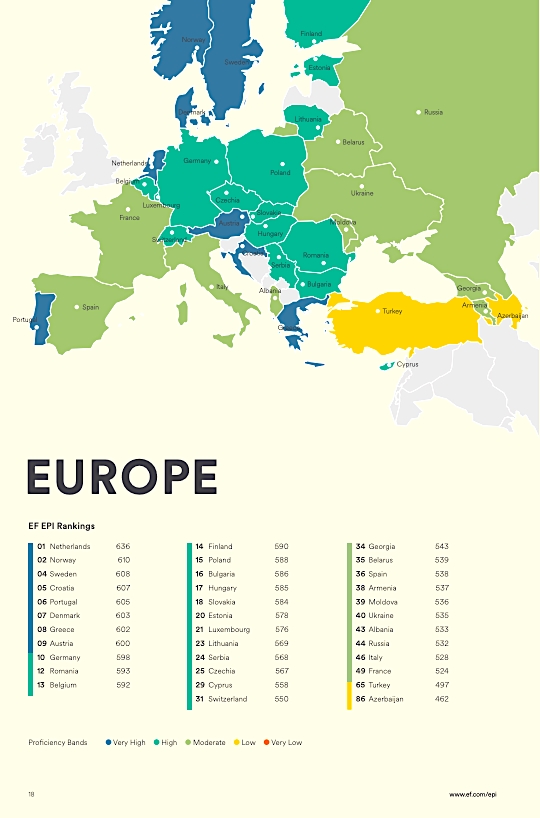Greeks are among the most fluent non-native English speakers in the world with the country ranking 8th among 116 regions and territories in the EF English Proficiency Index (EF EPI) released recently.
The EF EPI, the largest global ranking of English proficiency, evaluates results from 2.1 million participants in 116 countries & territories and in over 1,200 regions and cities.
According to the 2024 report, Greece ranked 8th receiving a “Very High Proficiency Country Score” of 602. Leading the way were the Netherlands (636), followed by Norway, Singapore, Sweden, Croatia, Portugal, Denmark, Greece, and Austria. The lowest proficiency levels were found in Libya, Rwanda, Côte d’Ivoire, Somalia and Yemen.

Greece’s capital, Athens, also scored highly for the English proficiency levels of its speakers, ranking 11th on the “Very High Proficiency – Capital after Amsterdam, Copenhagen, Vienna, Helsinki, Lisbon, Zagreb, Stockholm, Berlin, Bern, and Oslo. Just last year, Athens saw the opening of the first English-language theater in Greece: the Theater of the NO. Cities with very low proficiency scores were Kigali, Luanda, Abidjan, Delhi, and Mogadishu.
English Opens Doors
“The steadily increasing proficiency of Greeks in the English reflects not only their adaptation to the demands of the global market but also the shift within the Greek educational system towards language certification,” Ifigeneia Rigopoulou, Operations Director, Center for Examinations and Certification at the Hellenic American Union (HAU), tells To Vima International Edition.
The Greek Education Ministry has implemented policies promoting early English language learning, including instruction starting in kindergarten in public schools and the adoption of the International Baccalaureate system in private institutions.
“From international academic and professional advancement to engaging with a broader reality through access to news, information, art, and culture from every corner of the planet, learning English has become a bridge to an interconnected global landscape,” Rigopoulou says.
While global English proficiency levels have declined for the fourth consecutive year, with 60% of countries scoring lower than the year before, Greece is a notable exception.
Rigopoulou attributes the “remarkable” rise in the number of Greeks seeking certification at higher proficiency levels in recent years to ever-increasing demands and competition in the domestic job market, as well as to the desire by many to seek academic and/or professional opportunities abroad.
Investing in the Future
The trend toward higher English proficiency extends beyond Athens and urban centers. To Vima International Edition also spoke with Denise Tountopoulou, the owner and Director of Studies at one of the largest English language schools in Tripoli, capital of the Peloponnese Region with a population of 46,375.
Tountopoulou explains that although English is part of the public school curriculum, many parents feel that the level and frequency of instruction are insufficient to achieve fluency or prepare for exams, so they look to private institutes for that extra support.
For decades, learning English, was a very high priority in Greece with many parents choosing to send their children to privately run foreign language schools known as “frontistiria”.
“Parents recognize the structured approach and measurable progress these institutes provide, particularly when preparing students for internationally accredited certifications,” says Tountopoulou.
She adds that parents also see English language learning as an investment in their child’s future, which opens doors to better education and job prospects.
Rigopoulou underlines the “pivotal role” these schools have played, noting that “they have fully embraced the evolving needs of the educational system, while fostering not only linguistic improvement but also cultural and communicative awareness”.
Starting Young
In Tripoli, children typically start learning English in second or third grade, around the ages of 7 or 8. However, many parents now enroll their children earlier, at 5 or 6, so they can build a strong foundation and ease future learning. By their mid-teens, explains Tountopoulou, most students are ready to take advanced-level exams, such as the ECPE (University of Michigan) or the C2 Cambridge English exam. Highly motivated learners often sit for these certifications as early as age 14.
“Achieving certification early allows students to focus on national exams and other obligations while already possessing a qualification that enhances their academic and professional profiles,” she tells To Vima International Edition.
Nearly 80% of Greek candidates achieving higher-level English certifications are under 20, according to the Michigan Language Assessment’s test report. Rigopoulou emphasizes the role of the HAU in ensuring certification access to students from around the country.
The HAU has contributed significantly to the high levels of English proficiency in Greece, offering formal certification through its examinations since 1957. Located in the heart of Athens, the HAU also organizes art shows, film screenings, book presentations, lectures and workshops as well as offering Modern Greek courses.
Interest in EFL Growing Among Adults
A closer look at the EF EPI reveals that in 2024, women in Greece outperformed men in English proficiency levels, with 54% achieving higher performance scores compared to 46% of males. Public sector workers trailed behind their private-sector counterparts. Additionally, higher English proficiency was mostly concentrated in cities, especially capitals.
The report’s analysts note that rising English proficiency among working adults was a trend from 2015-2020, but the pandemic disrupted progress.
Proficiency levels have shown signs of stabilization post-COVID, though they are still falling in many countries.
Greece was again an exception. In the last few years, there appears to have been a growing interest in attaining English language skills among older students or adults. Both Rigopoulou and Tountopoulou link this trend to the growing demands of the globalized economy and the advancements in technology.
Many older students pursue English to improve career prospects, meet university requirements for study abroad, or to feel more confident while traveling,” says Tountopoulou.
Some adults learn English as a personal goal, finding it fulfilling to develop a skill that connects them to global media, literature, and culture and enables them to communicate more effectively for professional or social purposes.
Rigopoulou agrees that the shift towards a more expansive, global perspective has had a profound impact on the relationship Greeks have with the English language. English, she says, is not just a subject to study, but a gateway to broader opportunities in an increasingly interconnected world.
Founded in 1965, EF Education First specializes in language learning, cultural exchange, and educational travel, promoting English proficiency worldwide.




